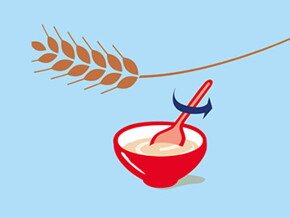
Risks Of All-Day Snacking For Children
Don't Let Your Child Eat Snacks All Day Long!
IMPORTANT NOTICE: The World Health Organization (WHO) recommends exclusive breastfeeding for the first 6 months and continued breastfeeding for as long as possible. Growing up milks are formulated to meet nutrition needs of healthy young children older than 1 year and should not be fed to infants.
According to experts, serving healthy snacks to a toddler at least twice a day, (i.e. few hours after the end of a meal and one to two hours before the next meal) can help him get all the essential nutrients he needs and protect him from childhood obesity.
Serving a toddler snacks high in sugar and empty calories in a random manner and throughout the day, however, can cause him an excessive increase in weight and make him more prone to chronic diseases as well as tooth decay, because of the below reasons:
- Your child’s teeth won’t have enough time to rest and prevent the repeated attacks of food between meals and snacks, which can contribute to tooth enamel erosion and caries.
- Foods high in carbohydrates, like crackers and bagels, can quickly turn into sugar, and sugar gets stuck on the teeth, eventually resulting in cavities.
- Most of children’s snacks, like fruit rolls and juices, contain a great amount of sugar for a very small amount of nutrients. Again this can cause the enamel to erode and the teeth to decay.
If you think that your child’s temporary teeth do not call for your attention, you are mistaken. Although they will be replaced by permanent teeth at a later stage, they are still quite important to teach him how to properly chew and speak, and determine his features and the place of his permanent teeth.
With this in mind, we recommend that you try as hard as you can to organize your child’s snacks in order not to overlap with his meals, and get him used to healthy food, like cheese, milk, cucumber, fruits and cereals made of wholegrain and other natural ingredients. For your toddler’s diet to be balanced and easily digestible, it shouldn’t contain artificial flavors or colorings but have many essential nutrients instead, such as: iron to keep anemia at bay, vitamin C to boost your child's ability to absorb iron, as well as probiotics, iodine, omega-3, zinc and vitamins B-1, which can collectively contribute to the development of your child’s brain and cognitive skills.
Read More: Importance Of Snacking For Children




















